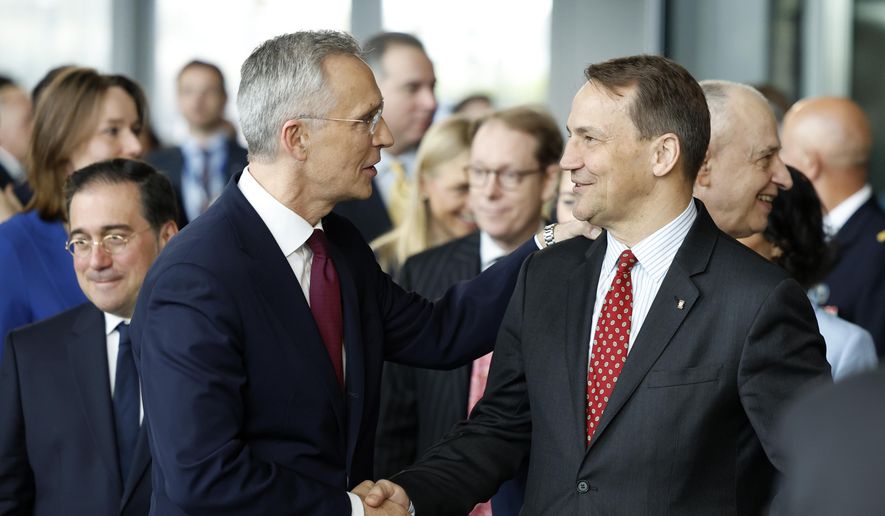WARSAW, Poland (AP) — Poland’s foreign minister called on NATO to increase its defense preparedness on Thursday and said his government wants to be at the center of decision-making in the European Union, seeking to reestablish the country as a reliable international partner as the war in Ukraine rages across the border.
Setting out his vision for Poland at the heart of Europe, Radek Sikorski warned that a Russian attack on NATO would end in defeat for Moscow, but NATO must increase its defenses.
The previous national conservative coalition government in Poland clashed frequently with the EU, especially over the rule of law.
Arguing that EU membership brought many benefits, Sikorski said: “That is why it is so important for Poland to return to the group of countries creating Europe, and not defending themselves against Europe.”
Ahead of the speech, the foreign ministry said Sikorski’s vision was closely aligned with that of French President Emmanuel Macron, who was also laying out his ambitions for Europe to be a more assertive global power in a speech on Thursday.
Senior Polish officials have welcomed Macron’s outspoken support for Ukraine but also want Paris to increase its deliveries of military aid.
“It is not we — the West — who should be afraid of a clash with Putin, but the other way around,” Sikorski said. “It is worth recalling this, not to increase Russians’ sense of threat, because NATO is a defense pact, but to show that an attack by Russia on any of the Alliance members would inevitably end in its defeat.
“Russia’s military and economic potential pales in comparison to that of the West. If we do not lack the will, Russia will lose. Putin’s only hope is our lack of determination.”
Under President Vladimir Putin, Russia has waged a hybrid war against Poland, including with disinformation, Sikorski charged. He said Russia was lying when it falsely claimed that Poland seeks to annex parts of Western Ukraine around the city of Lviv that once belonged to Poland.
Speaking in Ukrainian, he said: “Lviv is Ukraine.”
Sikorski’s speech set out the new direction of the pro-European government of Prime Minister Donald Tusk, which took office in December, replacing the coalition led by the arch-conservative Law and Justice party.
Among those attending the speech was President Andrzej Duda, who is aligned with Law and Justice, as well as members of the diplomatic corps in Warsaw who listened to the speech from the parliament’s gallery.
The government is also asserting its right to define Poland’s international policies as Duda has recently been acting against its wishes. Duda recently met with presumptive Republican presidential candidate Donald Trump and expressed openness to hosting nuclear weapons within NATO’s sharing program.
He did not seek approval from Tusk’s government for either step.
Sikorski harshly condemned many of the previous government’s policies, noting that former prime minister Mateusz Morawiecki was not in parliament Thursday because he had gone to Budapest for the annual meeting in Europe of the American Conservative Political Action Conference, or CPAC. Sikorski said Morawiecki would be meeting with “pro-Putin nationalists.”
After the speech, Duda said he was shocked and disappointed at what he called an “attack on the policy pursued by the previous government.”
“In my opinion, it was baseless and contained many lies, manipulations and untruths. This divides Poles and creates an unnecessary political conflict. These words simply provoked distaste in me,” Duda told reporters in the halls of Parliament.
Law and Justice led Poland from 2015 to 2023, and while it stressed ties with the United States, it had a conflicted stance toward the 27-member EU and in particular toward Germany, which invaded and occupied Poland during World War II.
Sikorski stressed the importance of friendship with Germany, saying that the period of confrontation under the previous government had ended.
“Differences of opinion, however, do not mean that we are doomed to eternal conflict. Germany is our democratic neighbor, our largest trading partner, an important European actor, and a key ally in NATO. Warsaw and Berlin need each other,” he said.
Sikorski argued that Poland’s development and security should be based both on trans-Atlantic cooperation and on European integration, and that it is also ready to take responsibility for global challenges.
Sikorski’s speech was directed at both the world and the domestic audience in the nation of 38 million people located along a geopolitical fault line.
Poland, a member of NATO and the European Union, is on the eastern flank of both and shares borders with Russia and Belarus in addition to Ukraine. It is a key hub for Western weapons going to Ukraine.




Please read our comment policy before commenting.